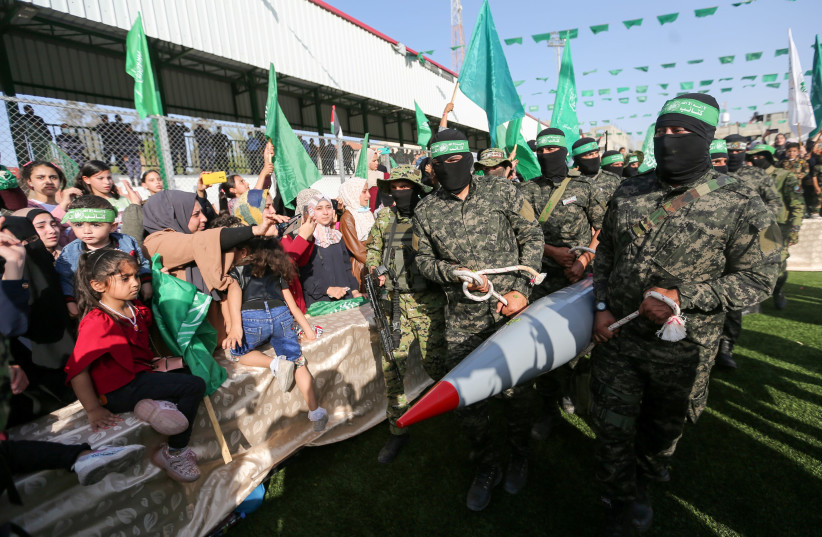The horrific attack by Hamas on October 7 has refocused global attention on the Palestinian issue. This shift is evident in US President Joe Biden’s statement that in the post-war period, “returning to the status quo of October 6 between Israel and the Palestinians is not an option.’”
He emphasized the cessation of Hamas’s terror attacks on Israel and underscored the necessity for a diplomatic resolution based on a two-state solution. Similar sentiments have resonated in Europe and the Arab world.
Thus, the Palestinian issue has once again taken center stage in international and regional discussions, prompting varied approaches. The first involves groups and individuals leveraging the ongoing war, and particularly Israel’s attack on Gaza, to champion the agenda of freeing Palestine “from the river to the sea,” which is a euphemism for the destruction of Israel.
The simple truth
They simply oppose Israel’s existence, perceiving it as a product of Western colonialism. Some advocate for a one-state solution where Jews would eventually become a minority.
The second approach is embraced by those acknowledging the State of Israel but interpreting Hamas’s actions as an integral part of the enduring conflict between Israel and Palestine.
This viewpoint echoes in the words of UN Secretary-General Antonio Guterres, emphasizing that “the Hamas attacks did not occur in a vacuum; the Palestinians have endured a suffocating occupation for 56 years.” President Erdogan of Turkey similarly remarked that “Hamas is not a terrorist organization; it is a liberation organization fighting for its land.” These statements resonate with voices portraying Hamas’s actions, however heinous, as part of the ongoing Israel-Palestinian conflict.

Biden’s stance embodies the third approach, representing the future strategy of the United States and its allies in Europe and beyond. This perspective is echoed in statements by leaders from states that have signed peace treaties or normalization agreements with Israel. For instance, President al-Sisi of Egypt highlighted that “resolving the Palestinian-Israel conflict will hinge on the two-state solution, offering hope to the Palestinians with a state within 1967 ‘borders’ and a capital in Jerusalem.”
Similarly, both the Saudi crown prince and foreign minister stressed the need for resolving the conflict through a two-state solution. The declaration issued by the Arab-Islamic summit on November 11, while condemning Israel on various grounds, concluded by urging an international initiative to establish a Palestinian state within 1967 ceasefire lines, alongside Israel.
For years, Netanyahu and others sought to convince the Israeli public that the Palestinian issue could be sidelined, postponed, or simply ignored through normalization with Arab states. However, the approximately three million Palestinians residing in the West Bank (Judea and Samaria), and the additional two million in Gaza, are not going anywhere.
Moreover, the conflict is likely to escalate in the West bank, especially amidst daily conflicts between Jewish and Palestinian residents. Some Jewish Israelis even perceive the ongoing war as an opportunity to fulfill their ideological and territorial ambitions in Gaza or Judea and Samaria, actions that could further inflame tensions in the Arab and Muslim worlds, as well as in the global arena.
World history, and particularly the history of the Arab-Israeli conflict, demonstrates that wars often create diplomatic opportunities previously deemed impossible, undesirable, or unthinkable.
Sadly, most of these opportunities were not seized. Thus, for example, in the aftermath of the 1967 War, Israel failed to leverage the opportunity to secure peace agreements in exchange for occupied territories. It was only the trauma of the 1973 war that eventually led to withdrawal from Sinai and a peace treaty with Egypt.
Likewise, the First Palestinian Intifada (1987–1991), the 1991 Gulf War, and the Soviet Union’s collapse set the stage for the Madrid Conference, which ultimately paved the way for the Oslo Accords with the Palestinians in 1993 and a treaty with Jordan in 1994. In contrast, the second Palestinian Intifada (2000–2005) triggered various diplomatic attempts – the Arab peace initiative of 2002, the American Roadmap of 2003, and Sharon’s disengagement from Gaza in 2005 – yet none yielded a final peace agreement.
Much like the Yom Kippur War, the October 7 massacre will be etched into Israeli national memory as a traumatic failure. While some Palestinians may perceive it as an “achievement,” for most Palestinians in Gaza, it remains a terrible and traumatic disaster. It’s evident that post-war scenarios will bring change, particularly concerning Hamas’s control of Gaza. However, the actual outcomes remain uncertain.
The initial step requires acknowledgment within Israeli society that a resolution for the Palestinian issue must be pursued because it is an Israeli interest.
In addition, the international community – led by the United States and most European and Arab states – will actively oppose any Israeli attempts to repopulate or govern Gaza or to expel Palestinians. Most of the actors involved in the war support the return of the Palestinian Authority, yet it is unclear how it will govern, given all its weaknesses.
Thus, following the traumatic Gaza war, the Israeli and Palestinian societies should undergo a process of disenchantment by which the maximalist ideas should be abandoned for a reasonable and moderate compromise. The two sides have reached what William Zartman termed a “mutually hurting stalemate.” There is no need “to invent the wheel.”
Many ideas had been put forward – such as the 2000 Clinton Parameters, the Arab Peace Plan, Roadmap and more, and they can be modified or reconfigured. Israel is approaching a moment of truth with regard to the Palestinian issue.
The writer lectures in the Department of Islamic and Middle Eastern Studies at the Hebrew University of Jerusalem and is a researcher at Mitvim – The Israeli Institute for Regional Foreign Policies.
